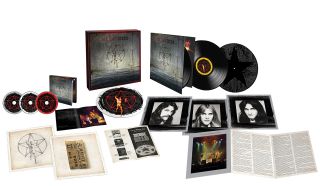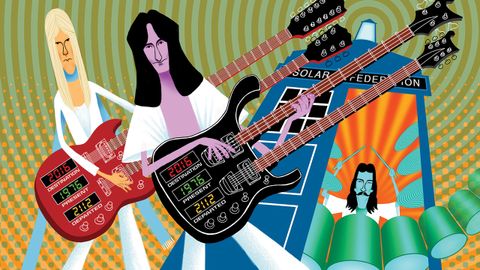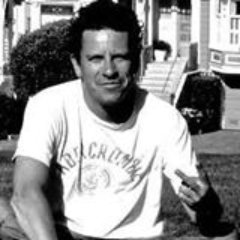Although essentially a critical and commercial failure, in hindsight, 1975’s Caress Of Steel provided a bedrock and a clutch of musical leitmotifs that gave Rush the confidence, if not quite full traction, that would steer them towards their first classic proper. Not that it appeared that way at the time. Bruised and deflated by critical and public antipathy, virtually on a record company final warning, rather than a steely intransigence, the prevailing mood was more of a resigned, “Fuck it, let’s stay true to the art and let the chips fall where they may.” Boosted in this regard by a reading of Ayn Rand’s The Fountainhead – over and above Anthem, an influence often overstated – in which an individualistic young architect refuses to compromise his artistic vision for recognition and success, it proved to be the most important decision of the band’s career.

Given a minor update at the end of 2012 for the deluxe version (likely numerical reasons: a centennial reverse-anniversary if you will), this 40th anniversary edition adds a plethora of extras – expanded artwork, a second disc of celebrity superfan cover versions, restored live footage from Passaic in ’76, a 25-minute interview with Alex Lifeson and producer Terry Brown – and a full remastering at Abbey Road.
At the risk of getting all audiophile-anal, it’s a remarkable job – veritably sparkling, as crisp, shiny and futuristic as the contents. The opening ominous swirling synths are piercing in their clarity and elsewhere, once-buried layered instrumentation resurfaces at unexpected moments, not least a brightly strummed acoustic before the brief appearance of Tchaikovsky’s 1812 motif. At a whisker over 20 minutes, the seven-movement title track is the longest in the canon, and definitively the most Rush-like. As Alex Lifeson said: “It was the first record where we sounded like Rush.” Chock full of the tropes, merely hinted at previously, that would go on to define the band’s core sound – syncopated stab rhythms, U-turn mood shifts and whimsical meanderings, all tightly knitted into a powerful, cohesive heaviness – it’s been a mainstay of their live set ever since.
The five somewhat disparate tracks that originally appeared on the album’s B-side have divided fans and press since the album’s release. And Rush fans do love a disagreement. Set against the peerless flow of the A‑side, there’s an argument to be made that they unbalance the whole (especially for those hankering for a Tales From Topographic Oceans-type continuity), yet taken in isolation, there’s a breadth of range and ingenuity compacted into shorter forms that presages any of the high spots of the Moving Pictures era.
- Rush's YYZ finally gets a vocal in mysterious Milkshake mash-up
- Rush star in new Family Guy episode
- Rush make $40,000 donation to Gord Downie cancer fund
- Why I love Rush’s Permanent Waves by Foo Fighter’s Taylor Hawkins
It’s a shame A Passage To Bangkok is faintly tarnished by the now-incongruent use of ‘The Oriental Riff’ (keeping dubious company with Carl Douglas’ Kung Fu Fighting and The Vapors’ Turning Japanese), but it’s hardly the most eyebrow-raising backward glance in the pantheon of rock’s follies.
The Twilight Zone (producer Terry Brown’s favourite track) is an absolute sleeper, Lifeson’s airy, laid‑back solo in particular a thing of wonder, gently floating in to land at the track’s close. Tears (covered on the bonus disc by Alice In Chains) echoes the uplifting melancholy in the Panacea section of The Fountain Of Lamneth from Caress Of Steel, equally illustrating the band’s nous with simpler structures.
Talking of the covers disc, it’s largely a quality affair, Rush being a particularly difficult band to either interpret or mimic. The aforementioned version of Tears by Alice In Chains drags the song groundward, their trademark minor-key harmonies lightly gritting the oyster, channelling the Scorpions as they go. Steven Wilson brings a modern ethereality to The Twilight Zone, featuring a pleasingly detuned spoken voice entirely reminiscent (probably deliberately) of the narrator in The Necromancer.
It falls to Dave Grohl, Taylor Hawkins and producer Nick Raskulinecz to attempt an ascent of Overture, and to their credit, they get near the summit. Shorn of the visually comic trappings of the live version performed at 2013’s Hall Of Fame, it’s played with a relatively straight bat, adding subtle idiosyncrasies, heft and obvious affection.
This has always been a widely loved and acutely important album, an unseen turning point at a crossroads without which the achievements of the last 40 years would be as unimaginable as the protagonist’s tribulations in the Solar Federation. Control was assumed.
Rush Quiz: How well do you know 2112?
The Top 10 Best Rush Songs Of The 80s
The History Of Rush By Geddy Lee & Alex Lifeson: From Rebirth To Retirement


